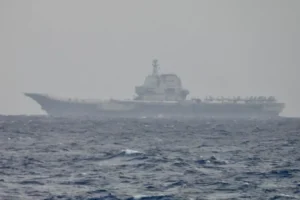The United States is ready to provide support for the Philippines if needed when it embarks on supply missions to a grounded warship in Ayungin (Second Thomas) Shoal in the country’s waters, a Pentagon official said.
The comments from Washington followed the reported presence of a US Navy P-8 Poseidon maritime patrol and reconnaissance aircraft during a resupply mission last week.
“Certainly, you’ve heard us publicly express our support for the Philippines and their right to sovereignty and their right to be able to operate within their own waters,” Pentagon Press Secretary Brig. Gen. Pat Ryder said in an Aug. 24 press briefing when asked about US military assistance during the latest supply mission.
“Broadly speaking, again, we will continue to work closely with the Philippines to support them as they request. And we’ll just leave it at that,” Ryder added.
The Philippines successfully delivered fresh supplies to its troops stationed at Ayungin Shoal on Aug. 22, despite efforts by the China Coast Guard (CCG) and Chinese maritime militia vessels “to block, harass and interfere” with the Philippine Coast Guard and Armed Forces of the Philippines personnel and vessels tasked with the mission.
According to journalists who were invited to witness the operation last week, the US Navy surveillance plane flew overhead for more than three hours while Chinese ships blocked and shadowed the Philippine vessels on the way to deliver supplies to soldiers manning the BRP Sierra Madre, a grounded World War II-era warship serving as a Philippine military outpost in Ayungin.
‘Full coordination’
On Aug. 5, one of two supply boats used by the Philippine Navy was forced to turn back after CCG vessels fired water cannons, preventing it from bringing food and other provisions to the naval outpost.
In a press briefing last Friday, Defense Secretary Gilberto Teodoro Jr. said the American plane was only “conducting freedom of navigation operations on their own, uncoordinated with us and which they do on a regular basis anyway.”
“They may have coordinated it, but that’s below my level, that level of coordination, if ever,” he said.
Teodoro also said he had “not come across” a reported plan by the Philippines to hold a joint resupply mission with the United States in Ayungin Shoal.
When asked about the deployment, US Embassy spokesperson Kanishka Gangopadhyay said: “What I can say is that all of our military activities in the Philippines are conducted in full coordination with our Philippine allies.”
The expressions of support for the Philippines were largely welcomed in the country given China’s continued incursions into Philippine territory and the implied threats to freedom of navigation in the South China Sea, a vital waterway through which a significant portion of global trade flows.
Aside from the United States, the Philippines has been engaging in joint military exercises with other allies in a bid to keep China’s aggression in check.
Japan’s de facto aircraft carrier JS Izumo (DDH-183) and destroyer JS Samidare (DD-106), for instance, are in Manila after holding the first quadrilateral joint exercises with the Philippines, United States and Australia aimed at strengthening cooperation.

The 19,500-ton JS Izumo is currently Japan’s largest warship since World War II and is capable of landing helicopters and carries advanced command, control, communications, computers and intelligence systems.
On Aug. 24 drills staged “in the vicinity of Manila” were joined by the Philippine Navy’s BRP Davao del Sur (LD-602), US Navy’s USS Mobile (LCS-26) and Royal Australian Navy’s HMAS Canberra (L02) and HMAS Anzac (D59).
JS Izumo’s Manila stopover is part of the Indo-Pacific Deployment Exercises 2023, a five-month-long operation that involves the participation of Japan in various naval joint exercises with allies aimed at strengthening cooperation.
‘Claims by force’
The Japanese warship was seen docked next to the US Navy’s light aircraft carrier USS America (LHA-6) at Pier 15 in South Harbor.
On Sunday, selected journalists including this writer toured the Japanese warship. A reception followed and was attended by around 200 guests from the Philippines, Australia, and the United States.
Japanese Ambassador Kazuhiko Koshikawa said in his remarks at the reception: “In line with our shared goal of a ‘Free and Open Indo-Pacific,’ I strongly believe that we, as like-minded nations, can work together and deepen our ties to safeguard the freedom of navigation at the seas and uphold a rules-based maritime order in the region.”
“Peace and international order cannot be maintained if military superpowers ignore international law and try to achieve their own claims by force,” he added.
On Aug. 14, Manila and Canberra kicked off their largest military exercises called “Alon,” which is part of Indo-Pacific Endeavor, Australia’s flagship international engagement activity in the Southeast Asian and Indian Ocean regions.
Alon 2023 is the first bilateral amphibious exercise between the Philippines and Australia.
On the sidelines of the Shangri-La Dialogue in Singapore in June, the defense chiefs of the Philippines, United States, Japan, and Australia agreed during their first quadrilateral talks to step up security cooperation especially in the South China Sea, in an effort to promote a free and open Indo-Pacific amid China’s actions in the region.









